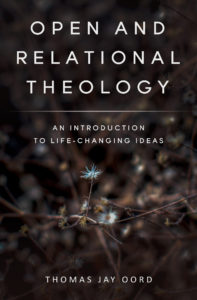I Need a Love Framework
My number one goal is to live a life of love. That goal gives purpose to my life. It’s my primary intention.
Because love is central, I seek a framework to make sense of love and the world. In my new book, I argue that Open and Relational Theology provides the best overall framework to answer my deepest questions about and to make sense of love.
Motivated to Love
Having a coherent love framework doesn’t guarantee I’ll always love. I try to love consistently. But I sometimes fail. An adequate theology of love provides confidence that my aim to love makes sense in the grand scheme of things.
I wouldn’t be motivated to love, for instance, if I thought I wasn’t free. I’d just do what I thought was predetermined and assume my self-centeredness was pre-decided.
I wouldn’t be motivated to prevent suffering if I thought God could do it singlehandedly. I’d assume the pain I encounter is part of a plan God designed. I’d assume victims get what they deserve.
Making Sense of Love
I couldn’t make sense of love—creaturely or divine—if my conceptual framework said it was not relational, which some conventional theologies claim. No, I believe love relationships are real.
I couldn’t love if I thought values were illusions and the categories of better and worse were entirely my preference. That’s extreme relativism, and love makes no sense without values.
I couldn’t love a God who sends people to eternal torment. And I wouldn’t make sense to me to love those I thought God was sending there. If God wants them to suffer forever, so should I.
I doubt I’d care for creation if I thought God didn’t care for it too. I might just let it burn, drown, and starve.
And so on.
A Love Framework
A love-based view of reality can make an enormous difference to how you and I live. If love is the greatest, the ultimate, the highest aim of God and existence, we ought to embrace theologies that make sense of that preeminence.
I believe open and relational theology makes sense of love’s supremacy better than any other. In the final chapter of Open and Relational, I spell out some of the details of what this means. I address self-love, other-love, love for God, and love for creation. I also address God’s own love and why so many theological frameworks make no sense.
Open and relational theology provides the most adequate conceptual framework for a theology of love.
Open and relational theology provides the most adequate conceptual framework for a theology of love. Share on X

Comments
Because love is central, I seek a framework to make sense of love and the world. In my new book, I argue that Open and Relational Theology .
What intrigues you about this statement, Sebastian?